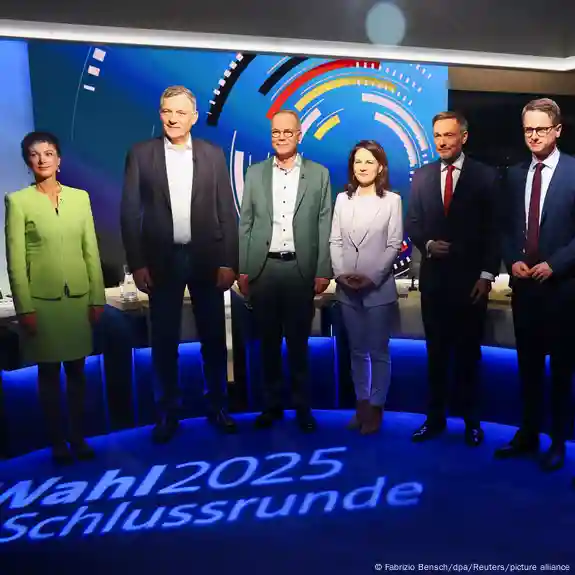
In a final television debate, leading German politicians and candidates for chancellor engaged in heated arguments about issues like healthcare, defense spending, and Russia’s invasion of Ukraine. DW has more.https://p.dw.com/p/4qni9
has more.
Annalena Baerbock, FDP candidate Christian Lindner, CDU General Secretary Carsten Linnemann, CSU parliamentary group leader Alexander Dobrindt and AfD chancellor candidate Alice Weidel
It was the last time for the parties to make their case in a debate before election day on
Germany’s elections are just three days away. Voters got one last chance to hear the various political parties competing make their pitch to voters.
Chancellor candidates Christian Lindner (FDP), Alice Weidel (AfD), Sahra Wagenknecht (BSW) and Jan van Aken (Left Party), took the stage for the Thursday evening discussion alongside high-ranking representatives of the Christian Democratic Union CDU, Christian Social Union CSU, the Social Democrats SPD, and the Green Party.
Notably, Germany’s current foreign minister, Annalena Baerbock, represented the Greens at the debate rather than chancellor candidate Robert Habeck.
Billed as “The Final Round,” the event aired with public broadcasters ARD/ZDF at 10 p.m. (2100 GMT). Debate participants touched on issues like Russia’s invasion of Ukraine, NATO, conscription and healthcare policy.
US President Donald Trump’s attitude towards Ukraine and the NATO alliance was also brought up.
Until now, the right-wing opposition parties have been leading in the polls. The CDU has hovered around 30% support and AFD is trailing them with around 20%.
Meanwhile, incumbent Chancellor Olaf Scholz’s center-left Social Democratic Party (SPD) is polling in third place with 15%, while their coalition partners, the Green Party, is coming in fourth with just over 13%.
Here is a roundup of top stories in the run-up to Germany’s February 23 parliamentary election on Thursday, February 20:
The parties also gave their takes on the climate crisis and how the country should approach energy policy.
In regards to increasing energy costs in Germany, the Left Party’s Jan van Aken said: “Not protecting the climate is costing us much more money.”
Van Aken claimed that the top 10% of society consumes 14 times as much energy as the average German citizen. Van Aken wants to tax the rich more to finance climate initiatives.
The CDU’s Linnemann criticized a heating law backed by the now fractured German governing coalition of the SPD, FDP and Greens, labeling it a “fiasco.” The law slowly replaces heating systems in German houses with those that consume mostly renewable energy.
The CDU has criticized the heating law as being negative for people who own homes in Germany. Linnemann and the CDU seek to repeal the legislation.
The FDP’s Christian Lindner said he was against a ban on gas and oil heating, and said the government has to be open to technology as part of its energy policy. “We need a new realism in climate and energy policy,” Lindner asserted.
The AfD’s Alice Weidel criticized Germany’s energy policy under former CDU Chancellor Angela Merkelwho stepped down in 2021. However, Weidel did not discuss her concrete approach to climate change.